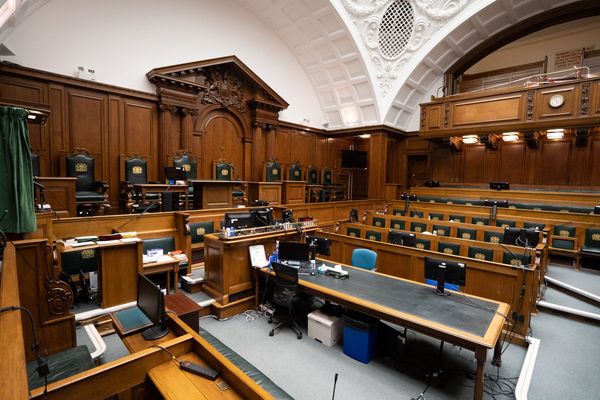It's a long way from Malaysia to El Salvador but the two countries may soon have a cryptocurrency connection.
A senior Malaysian official said the Southeast Asian country should adopt bitcoin and other cryptocurrencies as legal tender.
'It's Like a Domino Now.'
“We hope the government can allow this,” Zahidi Zainul Abidin, deputy minister of the Communications and Multimedia Ministry, said in Parliament, Bloomberg reported.
El Salvador adopted Bitcoin as legal tender last year and Ukraine recently passed a law that sets up a legal framework for the country to operate a regulated crypto market.
"It's like a domino now," one person said on Twitter. "One after another will become an orange nation. #Bitcoin adoption is inevitable!"
"One country has made #bitcoin legal tender so far rest is speculation," another person responded.
"Yeah.... Malaysia here we come..." another commenter said.
Bitcoin was down slightly to $41,041 at last check, according to CoinGecko.
Legal tender refers to money – typically coins and banknotes – that must be accepted if offered in payment of a debt.
Malaysia's central bank hasn’t announced any formal position on adopting bitcoin as legal tender, saying in January that it’s assessing whether to introduce a central bank digital currency, or CBDC.
Earlier this month, Deputy Finance Minister Yamani Hafez Musa said cryptocurrency is not a suitable method of payment for the country, noting that digital currencies are exposed to volatility.
Bitcoin City
El Salvador became the first country to adopt bitcoin with the government giving away $30 in free bitcoins to citizens who signed up for its national digital wallet, known as “Chivo,” or “cool” in English.
The original bitcoin law, passed in June 2021, said that "every economic agent must accept bitcoin as payment when offered to him by whoever acquires a good or service.”
This led to protests and as a result, El Salvador President Nayib Bukele tweeted in August that businesses did not have to accept bitcoin.
In November, Bukele said the country will build an oceanside “Bitcoin City” at the base of a volcano.
Bukele said the city will be circular to represent the shape of a large coin and will be built in the southeastern region of La Unión.
On the first day of 2022, Bukele tweeted that bitcoin will reach $100,000 and two more countries will adopt it as legal tender.
Last month, the country's tourism ministry said the adoption of bitcoin had sparked an increase in tourism.
Still, there have been challenges.
In January, the Executive Board of the International Monetary Fund urged El Salvador to remove bitcoin's legal tender status, citing concerns about "financial stability, financial integrity, and consumer protection."
"The adoption of a cryptocurrency as legal tender, however, entails large risks for financial and market integrity, financial stability, and consumer protection," the board said in a report. "It also can create contingent liabilities."
A Regulated Crypto Market
Earlier this month, the Chamber of Commerce and Industry of El Salvador said that 86% of businesses surveyed said they had never conducted a transaction using bitcoin.
Nearly 92% of the respondents said that the implementation of bitcoin has had no impact on their business. Only 3.6% of the respondents said bitcoin had contributed to increasing their sales.
Honduras, which opened its first cryptocurrency ATM on August, is also reportedly planning to accept bitcoin.
Last week Ukraine President Volodymyr Zelenskyy said a bill which sets up a legal framework for the country to operate a regulated crypto market.
Ukrainian legislators voted to legalize cryptocurrencies in February just prior to the Russian invasion.
Government officials said the move will reduce corruption risks and prevent fraud in the burgeoning exchange of digital currencies.
Ukrainians have raised thousands of dollars for volunteer groups by crowdfunding bitcoin, according to a recent study by Elliptic.
While financial institutions have clamped down on Russia, some of the world's largest crypto exchanges, including Binance, Kraken and Coinbase, are avoiding outright bans of Russian accounts.
Last week, the Ukrainian government announced that it will unveil a non-fungible token (NFT) collection of the Russian invasion.
Ukraine’s Deputy Minister of Digital Transformation, Alex Bornyakov said the collection would be “like a museum of the Russian-Ukrainian war. We want to tell the world in NFT format.”







